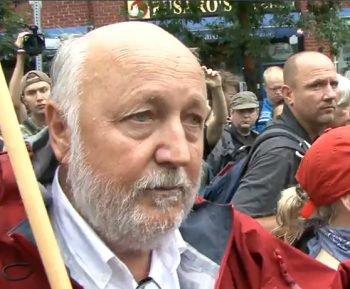The Conservatives have aggressively targeted civil society organizations that articulate a worldview different from their own.
Feminist groups, international NGOs and environmental organizations have all faced Harper government efforts to weaken their functioning. Now the Conservatives are targeting labour unions through an arcane bill known as an Act to amend the Income Tax Act (Labour Organizations).
Sponsored by Conservative MP Russ Hiebert, Bill C-377 is set for a third and final reading in the House of Commons this fall. Opposed by the opposition parties, almost all Conservative MPs have supported the Private Member’s bill.
Promoted as a way to improve transparency (not their own, of course), the bill is designed to challenge unions’ involvement in political activities and divert their resources to busy work.
C-377 would require every trade union and labour trust (pension plan, training fund as well as health and welfare funds) to file a public information return with the Canada Revenue Agency (CRA) on all expenditures over $5,000. It also mandates that labour organizations detail their disbursements to officers, directors and trustees and the percentage of time these individuals dedicate to political and lobbying activities.
The Conservatives are not requiring other professional associations that collect fees or dues from their members, such as the Canadian Medical Association or Law Societies, to follow the terms of Bill C-377.
The bill would allow employers and anti-union groups, at taxpayer and union expense, to get detailed information about a union’s spending. This could help them understand how strong the union they are bargaining with is and provide them with information to threaten collective bargaining rights and organizing drives. A similar database set up by George Bush’s administration in the U.S. is used by anti-union businesses to weaken workers.
C-377 is the latest in a long list of Conservative attacks against civil society organizations that articulate a worldview different from theirs. Because each sector of civil society has different vulnerabilities the Conservatives have taken a different angle in each case.
Early in the Conservatives’ first mandate they moved to weaken organizations pushing for gender equality. Most notably, the government cut funding to Status of Women Canada, which forced the organization to close most of its regional offices and cut support to many women’s groups.
Many of the more progressive-minded international development organizations have also seen their funding severed. Development and Peace and the Mennonite Central Committee believe they were targeted for calling on the government to better regulate Canadian mining companies operations abroad while the Canadian Council of International Cooperation, an umbrella group that represents 90 organizations engaged in aid efforts, lost its government funding after criticizing the Conservatives’ foreign aid policies.
Groups in any way associated with the Palestinian cause have also been openly attacked. The government chopped $7 million from Kairos, a Christian aid organization that had received government money for 35 years. During a December 2009 visit to Israel immigration minister Jason Kenney said Canada “defunded organizations, most recently like Kairos, who are taking a leadership role” in campaigns to boycott Israel (while sympathetic to Palestinians Kairos Canada, unlike the unaffiliated Kairos Palestine, did not endorse the boycott campaign).
Conservative ministers have leveled a number of well publicized broadsides against environmental organizations. They’ve accused them of being foreign funded “radicals,” “extremists” and former Conservative Party president and senator, Don Plett, even asked “would they [environmental organizations] take money from Al Qaeda, the Hamas or the Taliban?” In conjunction with these verbal attacks the Conservatives gave the CRA $8-million in March 2012 to audit the charitable status of environmental groups. Postmedia described it as “an $8-million plan to crack down on conservation groups.”
Even young Conservative Party activists have been instilled with Harper’s crush-all-other-social-voices attitude. At the start of 2009 two students, Ryan O’Connor and Aaron Lee-Wudrick, who previously worked for Conservative MPs, held a series of workshops advising young Party activists on how to get rid of campus public interest research groups (PIRG).
Organized through the Ontario Progressive Conservative Campus Association, their workshop at Wilfred Laurier was titled “challenging and defeating PIRGs”. Conservative Kitchener-Waterloo MP Peter Baird also spoke at the event. As part of this campaign, over the past few years a handful of PIRGs have faced a serious challenge to their funding and at least one lost its student support.
Now labour organizations, which are relatively autonomous as they are financed entirely by members’ dues and have a well-established legal footing, are in the Conservatives crosshairs. As most labour policy is a provincial matter, they’ve moved to rewrite the Income Tax Act to specifically target unions.
The Conservatives are only requiring the institutions created to represent the interests of millions of workers across the country to file these detailed records. There is no other way to interpret C-377 than as an attempt to disarm a political opponent.
Dave Coles is the National President of the Communications, Energy and Paperworkers Union of Canada (CEP).
What’s Harper up to? Award-winning journalist Karl Nerenberg keeps you in the know. Donate to support his efforts today.



